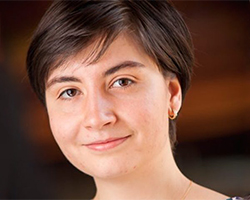Doctoral student Mitchell wins AWF Student Award
Shannon Mitchell, a second-year doctoral student in the Department of Biomedical Engineering, was honored for her service and research efforts that benefit women and gender minorities

Shannon Mitchell, a doctoral student in the Department of Biomedical Engineering at the McKelvey School of Engineering, was named a recipient of the 2021 Student Award by the Association of Women Faculty. The award recognizes academic excellence and leadership potential among female students whose research, teaching or service benefits women and gender minorities.
“I was excited and very honored to learn I’d been named to receive this award,” Mitchell said. “I think we all face adversities, but for me getting this award and being nominated as an African-American female, it was an honor to be chosen as one of two.
“Being a minority in the STEM field can have its challenges,” Mitchell added. “Having an association of faculty advocating for you and who allow you to get support from a host of different people is very beneficial.”
The Association of Women Faculty aims to promote professional and social interactions among women faculty, to defend campus-wide diversity and to advance the interests of women faculty at WashU.
Originally from Waldorf, Maryland, Mitchell earned two undergraduate degrees through a 3-2 engineering program: a bachelor’s in biology from Xavier University of Louisiana and a bachelor’s in biomedical engineering from North Carolina Agricultural and Technical State University (North Carolina A&T).
Now a second-year doctoral student at WashU, Mitchell conducts research in the lab of Princess Imoukhuede, associate professor of biomedical engineering. It’s a well-placed match, as Imoukhuede’s research activities and interests align well with Mitchell’s.
“I wanted to do women's health research, and I feel like that's such a broad umbrella of things that I could do,” Mitchell said. “I've also thought about doing a little bit of cancer research and diabetes research, but the whole goal is to help women overall.”
In Imoukhuede’s lab, Mitchell uses Surface Plasmon Resonance (SPR), a bioimaging technique, to build a computational model of oxytocin signaling in pregnant patients. Through this, she aims to better understand the mechanisms that regulate oxytocin signaling and efficacy in individual patients.
“Shannon is an intelligent and motivated PhD student who is committed to performing high-impact biomedical engineering research that benefits women,” wrote Imoukhedue, who nominated Mitchell for the award. “Her research on oxytocin dosing has the potential to significantly reduce maternal death rates in the United States and beyond.”
Beyond their shared research goals, Mitchell said she also appreciates the opportunity to work and mentor with another Black female scientist, who was named among the 1,000 inspiring Black scientists in America by Cell Mentor earlier this year.
"She’s able to explain and better talk about the challenges she has, not only as a woman faculty member, but as an African American faculty,” Mitchell said. “I have someone who understands me and who I can relate to.”
Outside of the lab, Mitchell works to increase minority student representation within McKelvey Engineering and the greater STEM field. She’s a member of a number of professional organizations, including the National Society of Black Engineers, and has participated in panels discussing opportunities for Black undergraduates in STEM.
“At North Carolina A&T, we are the No. 1 ranked producers of African-American engineers, but I would've never known about WashU if my teachers hadn’t told me,” Mitchell said. “If WashU could have more of a presence, especially at the career fairs or other recruitment activities in the school, I think we could increase our numbers.”
When asked what she hopes to do after graduation, Mitchell said she’s plans to keep an open mind.
“I’ve always taken opportunities when they’ve come,” she said. “I want to do women’s research, and currently, I’m taking the opportunity when it comes.”



